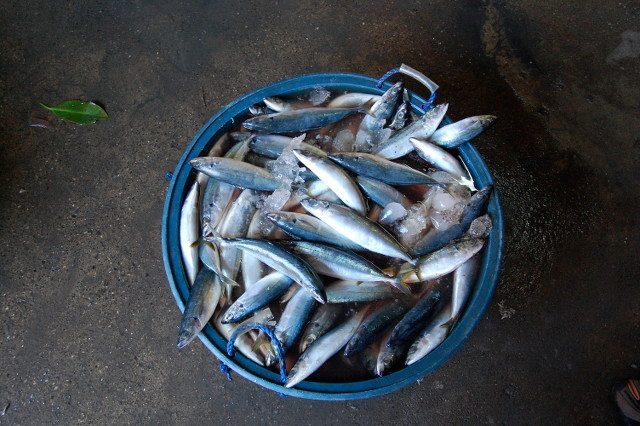SUMMARY
This is AI generated summarization, which may have errors. For context, always refer to the full article.

MANILA, Philippines – The Philippines has 6 more months to shape up its campaign against illegal, unreported and unregulated (IUU) fishing.
In a decision issued on February 13, the European Commission extended by 6 months the time given to the Philippines before deciding whether or not to ban the country from exporting fish to the EU.
Aside from the Philippines, Papua New Guinea and Ghana were also given a 6-month extension. Sri Lanka, however, was slapped with a ban last January.
“I am pleased that the Philippines and Papua New Guinea have taken their warnings seriously, and that Ghana continues to cooperate closely with the Commission. All 3 countries have shown political will and have made tangible progress in fighting illegal fishing,” Karmenu Vella, European Commissioner for Environment, Maritime Affairs, and Fisheries said in a statement.
The EU lauded efforts of the countries to amend fisheries laws, improve monitoring systems of fishing vessels and fish catch, and took notice of their proactive role in fulfilling requirements of international fishing regulations.
The extension retains the “yellow card” slapped on the Philippines last June 2014. The next 6 months will determine if the yellow card will be lifted or extended, or if a red card will be issued, translating to a total ban of fish imported from the Philippines.
A red card would be a big blow to the Philippine fisheries industry. The EU is one of its biggest markets with fish exports to the union amounting to billions of pesos.
In 2013 alone, the Philippines exported P9.4 billion (165 million euros) worth of fish products to the EU, according to the Bureau of Fisheries and Aquatic Resources (BFAR).
The warnings issued by the EU to fishing countries follow a 2010 commitment to close the union’s market to illegally caught fish.
The EU, the world’s biggest fish importer, aims to allow only legally-caught fisheries products to enter its market. It has already declared import bans against Belize, Cambodia, Guinea and Sri Lanka.
Clock ticking
The extension is both a good thing and a bad thing, weighs in Greenpeace fisheries campaigner Vince Cinches.
Though the extension is proof of substantial progress made, the clock continues to tick on crucial reforms that need to be implemented.
“It’s really important for President Aquino to sign the transmitted version of the Fisheries Reform law because it’s urgent to show overfishing commercial fishers that we are serious,” Cinches told Rappler.
The Fisheries Reform Law, which seeks to amend the 16-year-old Philippine Fisheries Code of 1998, is just waiting for the President’s signature.
Unless the President vetoes it, it will lapse into law on February 27, two days after the Fisheries Code’s 17th birthday.
But Cinches, who has been active in multisectoral consultations by the BFAR and lawmakers, suspects the delay is due to the accommodation of the concerns of commercial fishers.
In several newspaper ads, commercial fishers cried foul over the “cruel and unusual” penalties in the proposed law.
The Alliance of Philippine Fisheries Federations Inc balked at the huge fines for commercial fishers for fishing without a permit, destroying marine habitats or fishing in municipal waters which are reserved for small fisherfolk.
Commercial fishers will also have to pay for the installation of monitoring equipment so that authorities are able to track their location at all times.
“The thing is, many of them don’t want to be found because they might get caught fishing in municipal waters,” said Cinches.
Scientists and fisheries authorities have blamed unsustainable commercial fishing for the depletion of fish stocks in the Philippines.
Commercial fishing vessels, with their efficient and wide-scale fishing methods, are able to harvest fish at a rate at which fish stocks are unable to replenish themselves.
Taking strides
The BFAR has been “doing everything humanly possible” to fulfill EU requirements, bureau director Asis Perez told Rappler in a previous interview.
One requirement is to increase its personnel involved in port inspection. The agency has already hired 50% of its targeted 1,400 additional port inspectors to keep watch over fish catch that arrive in ports nationwide.
They are also now in talks to purchase a vessel monitoring system to be able to track all fishing vessels that fish in Philippine waters. They are adding “floating assets,” or boats to be used to catch illegal fishers.
But it’s the signed fisheries reform law that can help seal the deal, said Cinches. While the government is still working out the law’s implementing rules and regulations (IRR), he said civil society organizations, fisherfolk groups, and the academe plan to craft their own IRR.
“In 6 months, we hope to communicate this directly with the EU. We want to submit a clear paper, aside from the BFAR,” he told Rappler.
The clock is ticking not only for the Philippine government, but for the world’s seas. 10 out of the Philippines’ 13 major fishing grounds are overexploited. The EU says 15% of the world’s catch are illegally caught. – Rappler.com
Add a comment
How does this make you feel?
There are no comments yet. Add your comment to start the conversation.